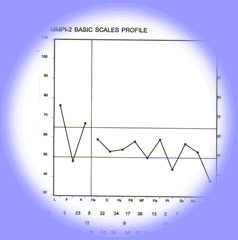|
Instructor: William P. Wattles, Ph.D. Office: CEMC 109G
Phone: 661-1639
Class meets: Wednesday 5:30-8:30 p.m. CCHS 111
Office hours: 9:00-10:30 Monday-Friday & by appointment
E-mail: wwattles@fmarion.edu
Web page: http://fpweb.fmarion.edu/wwattles
Texts: Clear
here to print a copy
Groth-Marnat, G. (2003). Handbook of Psychological
Assessment (5th ed.) New York: Wiley
American Psychiatric Association (2013). Diagnostic
and statistical manual of mental disorders (5th ed.).
Washington, DC. American Psychiatric Association.
Graham, J. R. (2006) MMPI-2: Assessing Personality
and Psychopathology (5th. ed.). New York: Oxford University Press.
Grades: Final grades will be determined as follows:
| Two
exams |
40% |
|
Grading scale |
| Reports |
30% |
|
A |
90-100 |
C+ |
77-79 |
| Participation |
20% |
|
B+ |
87-89 |
C |
70-76 |
| Quizzes |
10% |
|
B |
80-86 |
NC |
<70 |
Attendance policy: The FMU catalog states: "It is the
responsibility of the student to attend all scheduled meetings in the courses in
which he/she is enrolled. If a student is absent more than twice the number of
required class ... sessions per week during the regular semester ..., a grade of
NC of W will normally be assigned..." Thus, students missing three or more
classes (20%) will be dropped from the class.
Reports: Students will prepare a minimum of four evaluations. They
will interview the client, administer appropriate tests including the MMPI-2,
score and interpret the tests and write a report for each. The report must meet
professional standards as discussed in class and demonstrated in sample papers.
Late papers will not be tolerated and will be assessed a minimum of 10 points
per class that they are late. Any exceptions must be approved by me in advance.
|
Tentative Schedule Spring 2017
|
| Week |
Date |
Subject |
PPT |
Reading |
| 1 |
9-Jan |
Introduction |
|
G-1 |
| 2 |
16-Jan |
The assessment interview |
|
G-3, DSM-5 1-25 |
| 3 |
23-Jan |
Report Writing |
|
G-15 |
| 4 |
30-Jan |
MMPI-2
General issues |
|
G-7
, Graham 1-113 |
| 5 |
6-Feb |
MMPI-2
Psychometrics Report 1 |
|
Graham 117-222, 222-345, |
| 6 |
13-Feb |
MMPI-2, Clinical issues |
|
Graham 395-446 |
| 7 |
20-Feb |
Treatment Planning Report 2 |
|
G 14 |
| 8 |
27-Feb |
Mental Status exam, Brief
Assessments |
|
G 79-83, G13 |
| 9 |
6-Mar |
Mid-term
Exam |
|
|
| 10 |
13-Mar |
SPRING BREAK, YEAH ! |
|
|
| 11 |
20-Mar |
Milan Scales Report 3 |
|
DSM-5
645-684, 761-781, G-8 |
| 12 |
27-Mar |
Behavioral Assessment
Report 4 |
|
G-4 |
| 13 |
3-Apr |
Neuro Psych testing, IQ
tests |
|
G 12, G5 |
| 14 |
10-Apr |
Projective tests Context of
Clinical Assessment Report 5 |
|
G10-11, G2 |
| 15 |
17-Apr |
Final Exam |
|
|
From IBAMPP accreditation standards:
The program must include evidence of competence in the following
areas:
B. Understanding of methodology used to investigate questions and acquire
knowledge in the discipline. This could include study in research design and/or
methodology, statistics or critical thinking and scientific inquiry. At a
minimum, there should be one course in research methods and/or statistics as
applied to psychological questions."
Advanced psychometric theory (factor analysis) is presented with coverage of
measurement statistics used in the MMPI-2 and other tests. Theory and
statistical background is applied to these instruments and the evaluation
of instruments that assess personality and psychopathology including projective
techniques and vocational interest inventories.
C. Applied Psychology
1. Coursework in the theory, history, and applications of psychological
principles and theories appropriate to the sub-discipline;
...
... The following phrases taken from the indicated reference materials
document coverage of history and theory in the respective courses:
- Psychometric theory (reliability, generalizability theory, construct
validation)
- Behavioral assessment theory
- Basis of projective testing
- Ethical principles
- Basis of actuarial assessment vs. Content interpretation
- Basis of interest testing
3. Ethical and Professional standards.
4. Sensitivity to social and cultural diversity, resulting inappropriate
assessment and intervention strategies and other professional behaviors:
5. Teaching of assessment relevant to goals of the
training program (e.g., interviewing techniques, program evaluation).
- Examination of psychometric techniques applied to the assessment of
personality and psychopathology
- Psychometric theory
- Behavioral assessment theory and methods
- Basis of Projective testing
- Basis of actuarial vs. content interpretation
- Interpretation of the MMPI-2, Millon
- Basis of interest testing and familiarity with the Strong
- Mental status exam and neuropsychological screening
- Use of structured diagnostic interview schedules
- Relationship of assessment to referral questions and findings to
treatment planning
Specific Course Goals and Objectives:
Be accountable to program planning documents, the catalog, and IBAMPP and
accreditation standards as published that relate to this course.
Introduce the graduate student to the scientific basis for psychological
assessment procedures.
Develop an Understanding of psychometric theory as applied to assessment
procedures.
Develop understanding of the psychometric principles of reliability,
validity, utility, generalizability.
Establish a basis for the ethical and responsible use of psychological
tests.
Develop the ability of students to administer, score, interpret and report
findings from selected psychological assessment procedures.
Develop report writing skills that combine background information,
observations of behavior and assessment results in a technical style.
Provide expert knowledge and practical skill development with the MMPI-2.
Provide basic knowledge and practical skin development with projective tests
of personality, mental status exams, neuropsychological screening and
vocational interest.
Develop sensitivity to culture, racial and other diversity issues that have
historically been issues of concern in regard to psychological assessment.
| Last updated
12/16/16 10:46 AM |
Home Page |
Will Wattles
Francis Marion University
Department of Psychology
P.O. Box 100547
Florence, South Carolina 29501-0547
843-661-1639 |
Send me an e-mail at wwattles@fmarion.edu
 |
|
